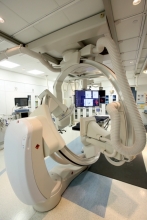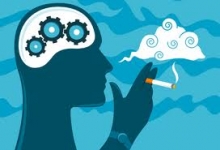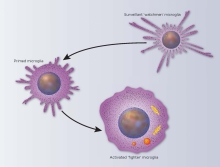Dr. Robert J.

Research opens door to new drug therapies for Parkinson’s disease

Live 3D images of brain’s vasculature will improve patient diagnosis and treatment
The diagnosis and treatment of potentially life-threatening neurological conditions such as aneurysms and strokes will be significantly improved as a result of cutting-edge technology at the Montreal Neurological Institute and Hospital - The Neuro, at McGill University and the MUHC. The new angiosuite, inaugurated today, offers significant advantages to patients and physicians including most importantly, improved safety and outcomes.

New study shows what happens in the brain to make music rewarding
A new study reveals what happens in our brain when we decide to purchase a piece of music when we hear it for the first time. The study, conducted at the Montreal Neurological Institute and Hospital – The Neuro, McGill University and published in the journal Science on April 12, pinpoints the specific brain activity that makes new music rewarding and predicts the decision to purchase music.
What is Parkinson’s Disease?
Powerful treatment improves patients’ lives and provides new insight into mechanisms of the disease
A team of basic and clinical scientists led by the University of Montreal Hospital* Research Centre’s (CRCHUM) Dr. Nathalie Arbour has opened the door to significantly improved treatments for the symptoms of Multiple Sclerosis (MS). In a study selected as among the top 10% most interesting articles published in the Journal of Immunology, the team identifies the elevated presence in MS patients of a type of white blood cell (CD4 T cell) that expresses NKG2C, a highly-toxic molecule harmful to brain tissues.
March - National Epilepsy Awareness Month
The Neuro has been at the forefront of epilepsy treatment and research for over half a century. The development of “The Montreal Procedure” by Dr. Wilder Penfield and his colleagues revolutionized the surgical treatment for epilepsy allowing thousands of patients to start new lives – free of seizures.


Montreal researchers find that music lessons before age seven create stronger connections in the brain
If you started piano lessons in grade one, or played the recorder in kindergarten, thank your parents and teachers. Those lessons you dreaded – or loved – helped develop your brain. The younger you started music lessons, the stronger the connections in your brain.

Guidance proteins regulate brain plasticity

January 29, 2013 - Addiction to cigarettes, drugs and other stimulants has been linked in the past to the brain’s frontal lobes, but now there is scientific evidence that indicates where in the frontal cortex addiction takes hold and how. Addiction could be a result of abnormal communication between two areas of the frontal lobes linked to decision-making. The discovery will undoubtedly stimulate clinical work on new therapies for millions of people who suffer from addiction.

January 28, 2013 - The European Commission has officially announced the selection of the Human Brain Project (HBP) as one of its two FET Flagship projects. The new project will federate European efforts to address one of the greatest challenges of modern science: understanding the human brain.
Addiction to cigarettes, drugs and other stimulants has been linked in the past to the brain’s frontal lobes, but now there is scientific evidence that indicates where in the frontal cortex addiction takes hold and how. Addiction could be a result of abnormal communication between two areas of the frontal lobes linked to decision-making. The discovery will undoubtedly stimulate clinical work on new therapies for millions of people who suffer from addiction.

In many pathologies of the nervous system, there is a common event - cells called microglia are activated from surveillant watchmen into fighters. Microglia are the immune cells of the nervous system, ingesting and destroying pathogens and damaged nerve cells. Until now little was known about the molecular mechanisms of microglia activation despite this being a critical process in the body.
